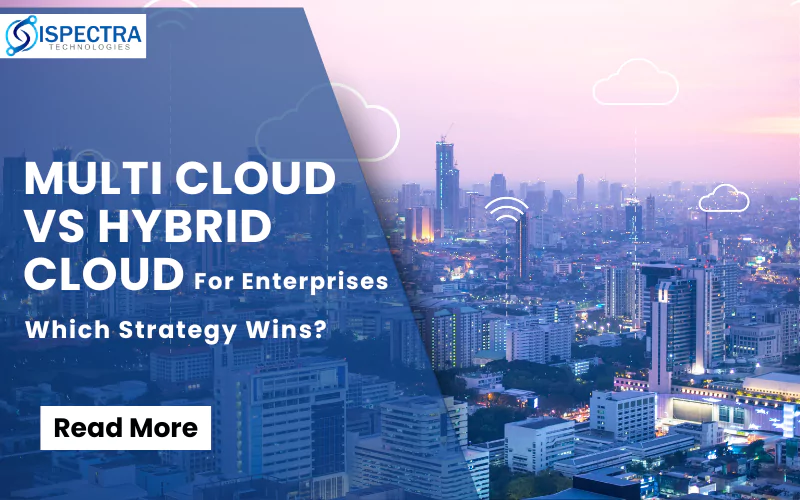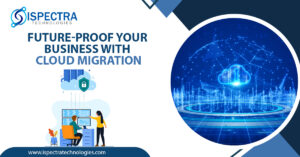Multi Cloud vs Hybrid Cloud for Enterprises: Which Strategy Wins?

In today’s digital world, businesses are looking to the cloud to be agile, reduce costs and drive innovation. Two of the most widely discussed cloud approaches are multi-cloud and hybrid cloud. While both offer flexibility and scalability, they serve different business needs and operational models. So, when it comes to multi cloud vs hybrid cloud, which one wins for businesses?
In this blog post, we’ll break down the differences, advantages, challenges and use cases of each to help you decide the right cloud strategy for your organization.
What is Multi Cloud?
Multi cloud means using services from multiple cloud providers such as AWS, Microsoft Azure, Google Cloud Platform (GCP), or Oracle Cloud—in a single architecture. Unlike hybrid cloud, multi cloud environments have more than one public cloud provider and don’t require integration with on premises infrastructure.
Multi Cloud Characteristics:
- A Mix of public cloud services from different vendors
- No on premise component required
- Best-of-breed services selection
- Redundancy and risk mitigation across vendors
What is Hybrid Cloud?
A Hybrid cloud combines public cloud, private cloud and/or on premises infrastructure into a single environment. This enables data and applications to be moved between environments based on business, security, or compliance requirements.
Hybrid Cloud Characteristics:
- Seamless integration between public cloud and private/on prem environments
- Centralized orchestration and management
- Designed for data sovereignty and compliance-sensitive workloads
- Gradual cloud adoption
Multi Cloud vs Hybrid Cloud: Head-to-Head Comparison
| Feature | Multi Cloud | Hybrid Cloud |
| Architecture | Multiple public clouds | Public + private/on-prem |
| Vendor Dependency | Low (more flexibility) | Moderate (integrated systems) |
| Complexity | High (multi provider coordination) | High (integration across environments) |
| Security | Dependent on provider tools | Customizable; often more controlled |
| Compliance | Can be tricky to manage | Easier to control in private clouds |
| Use Case | SaaS companies, global apps | Regulated industries, legacy systems |
| Latency Control | Depends on cloud vendor locations | Better with edge/on-prem integration |
| Disaster Recovery | Strong due to redundancy | Strong if on-prem systems are robust |
Multi Cloud Benefits
- No Vendor Lock In
Switch providers or use best-in-class services from different vendors without being tied to one ecosystem. - Resilience and Redundancy
If one provider goes down, workloads can be moved to another, and business continuity is guaranteed. - Cost Optimization
Pick services based on performance vs. cost trade-offs across platforms. - Innovation Flexibility
Different vendors innovate in different ways. Using multiple clouds means access to the latest technologies.
Hybrid Cloud Benefits
- Data Sovereignty and Compliance
Regulated industries (e.g. healthcare, finance) can store sensitive data on-prem or private cloud while using public cloud for scalability. - Smooth Cloud Transition
Enterprises with significant legacy infrastructure can modernize gradually without full migration. - Latency Optimization
On-prem or edge computing resources for mission-critical apps. - Unified Management
Centralized orchestration tools for a cohesive management experience across environments.
Challenges to Consider
Multi Cloud
- Tool sprawl and complexity: Different APIs, monitoring tools, billing models.
- Security inconsistencies: Different security policies and standards.
- Skilled workforce required: Managing multiple environments requires cross-platform expertise.
Hybrid Cloud
- Integration difficulties: Connecting legacy systems to modern cloud services.
- Cost of private infrastructure: Maintaining on-premises environments is expensive.
- Latency in synchronization: Data does not always flow seamlessly across environments.
When to Choose Multi Cloud
- You want maximum flexibility and don’t want to be tied to one cloud provider.
- Your business requires high availability and uptime guarantees.
- You need to scale globally and want different providers based on geography.
- Your application architecture supports containerization and cloud-native.
Real World Example:
A global e-commerce company uses AWS for North America and GCP for Europe, optimizing for latency and regional compliance.
When to Choose Hybrid Cloud
- You operate in highly regulated industries where some data must stay on-premises.
- You have legacy infrastructure and are not ready for full cloud migration.
- You want to do edge computing or need local data processing.
- Your organization is looking for a phased cloud adoption approach.
Real World Example:
A healthcare provider uses Azure for AI-powered analytics in the cloud while storing patient records on a secure on-prem server to meet HIPAA compliance.
Multi Cloud vs Hybrid Cloud: Which One Win?
There’s no one-size-fits-all answer. The winner is the strategy that aligns best with your business goals, compliance requirements and technical capabilities.
- Choose Multi Cloud if agility, innovation and avoiding vendor lock-in are your top priorities.
- Choose Hybrid Cloud if regulatory compliance, legacy integration and tight control over infrastructure are more important.
For many organizations, the answer is a combination of both, starting with hybrid cloud and evolving into multi cloud as maturity and demand grow.
Conclusion
In the multi cloud vs hybrid cloud debate, the real question is: what does your business need today and how can your cloud strategy adapt for tomorrow?
As the cloud landscape changes, so should your approach. Whether you choose hybrid, multi or even hybrid-multi cloud, the key is to be flexible, secure and scalable.
Looking to choose the right cloud strategy for your business? Start by assessing your current infrastructure, compliance requirements and business goals, then build a roadmap that balances performance, cost and agility.
Optimize Your Cloud Today
Whether you’re planning your first cloud migration or reevaluating your current setup, understanding the difference between multi cloud and hybrid cloud is crucial. Choose the path that meets today’s needs and scales with tomorrow’s innovation with Ispectra Technologies.
Categories
- Cloud Engineering (3)
- Cloud Transformation (11)
- Cyber Security Services (24)
- DPDP (3)
- GDPR Services (6)
- Healthcare (6)
- HIPAA (1)
- ISO 27001 certification (7)
- RCM (1)
- Revenue Cycle Management (1)
- SIEM (2)
- SOC 2 (2)
- SOC 2 Audit (28)
- SOC 2 Certification (1)
- SOC 2 Compliance (16)
- Software Engineering (6)
- Strategic Risk Management (SRM) (2)










